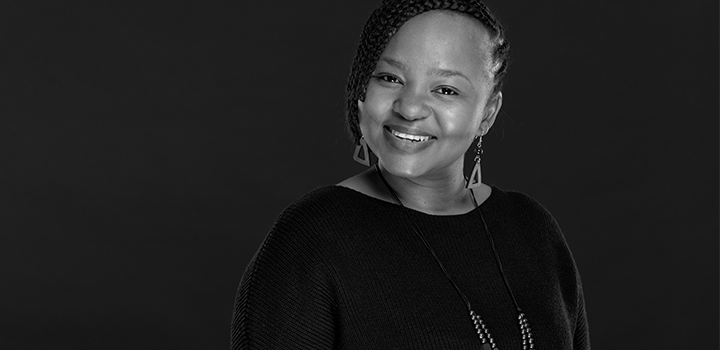Persevering against the odds to save critically ill children

Sometimes a single carefully focussed intervention – like funding the training of an intensivist for an under-staffed, under-equipped intensive care unit at the Nelson Mandela Academic Hospital in Mthatha – can be the catalyst for dynamic change.
Paediatrician Dr Nandipa Sotobe-Mbana, currently undergoing her two-year training in paediatric critical care at the Chris Hani Baragwanath Hospital in Gauteng, is about to become a living example of the power of one. She comes fortified with the fundamentals of passion, dedication and a determination to make a difference. Her return to Mthatha in 2021 will have a ripple effect across the province.
Discovery Foundation Subspecialist Award recipient makes waves
Unless there is another intensivist posting, she will be the only paediatric critical care subspecialist in Mthatha’s private and public sectors, teaching registrars, tackling the shortage of ICU nurses and improving liaison with the other two ICUs in East London and Port Elizabeth.
Nelson Mandela Academic Hospital is the only critical care referral centre for some 6.8 million people across the former Transkei. “Not one of the 20 or so referring hospitals can fully support critically ill patients, nor do they have adequate ventilation facilities or appropriately trained staff,” Dr Mbana says.
The hospital has seven paediatric ICU beds and eight paediatric high care unit beds, overseen by two paediatricians (one, now that Dr Mbana is in Gauteng) and one ICU nurse to two patients (the WHO recommended ratio is one-to-one).
Demands of the job
“It can be physically and emotionally strenuous. It is often difficult to choose who to admit. You have to look at their prospects of survival or else you can block a bed for others, possibly for days. Sometimes you just keep working because you are concerned about a particular patient. It’s often difficult to let go and you can work into the night,” she admits.
Asked how the paediatric ICU at Chris Hani Baragwanath Hospital compares, she says there is definitely more pressure at her home hospital. “At least here at Bara you can find another ICU to hold the patient. If a patient does not get in at Nelson Mandela Academic Hospital, there is nowhere else to go.”
“Our mortality at Nelson Mandela Academic Hospital is higher than other ICUs in the country, mainly because of the lack of expertise. However, mortality has declined slightly since the constant attendance of a paediatrician since 2015,” she adds. If she could change her home ICU, she would prioritise a life-saving high frequency oscillatory ventilator. Her second wish would be for more qualified ICU staff and nurses, while training people who can support critically ill patients in referring hospitals is third.
ICU patient profile
The majority of her child patients at Nelson Mandela Academic Hospital is medical cases. Vehicle accident victims with traumatic brain injuries, and patients with pneumonia, meningitis, cardiac failure and post-operative patients are common.
Dr Mbana is intimately acquainted with the daily challenges many South Africans face. She was born to a teenage single mother who died in 1996, aged 30, and raised by her grandparents. Her grandmother was a nursing matron at Mthatha General Hospital and her grandfather a lecturer at Walter Sisulu University.
While she loved biology at school and developed an independent interest in healthcare, her grandparent-custodians were a major academic influence.
“My grandfather died two years ago at the age of 88, two years after graduating with a PhD degree in theology,” she says proudly. Dr Mbana is married to an Mthatha civil engineer and moved with her two children to Roodepoort for the duration of her training. Her upbringing was the first single, carefully focussed intervention and it has borne huge fruit, seeding her Discovery sub-specialty award for paediatric critical care. Few in Mthatha will forget her legacy.
Seeing opportunities everywhere
Another revelation for her while sub-specialising in Gauteng is the collaboration between hospitals. “In the Eastern Cape, everyone seems to work independently. There’s great potential to grow the three ICUs together and share the load, in spite of the distances.”
She is enthusiastic about the benefits of her training. “Besides the teaching I can offer, I can help develop policies and ethical guidelines. I really want to strengthen capacity. Countrywide, we have a growing population and huge trauma-related pathology. Managing suitably qualified specialists has shown to improve patient outcomes and reduce costs,” she concludes.
Funding education at Harvard Medical School's teaching hospital
The Discovery Foundation MGH Fellowship Award was introduced in 2013 in partnership with the prestigious Massachusetts General Hospital (MGH). Based in Boston in the United States, MGH is a clinical service and biomedical research facility, as well as the Harvard Medical School’s largest teaching hospital.
The award aims to develop the next generation of leaders in academic and clinical medicine in South Africa. It does so by enabling a talented specialist clinician and aspiring leader to experience the specialist clinical service and research environment at MGH, and to conduct cutting-edge clinical research in collaboration with colleagues at the hospital, over a one-year period. The award is valued at R2.1 million.
Related articles
Dr Chetty embraces the chance to ease SA's pain burden
Since arriving in Boston on June 2019 to study pain management, anaesthesiologist Dr Sean Chetty is slowly settling into the new way of life - and is excited about what his Discovery Fellowship-funded year has in store.
Dr Maswime brings home global learnings in women’s health
Millions of childbearing women in SA are HIV-infected, but there is hope. The return of Dr Salome Maswime after a Discovery-funded year in America studying placental pathology with the world’s best clinicians will no doubt save even more lives.
Discovery Fellows bring cutting-edge medicine to SA shores
The Discovery Foundation MGH Fellowship Award – valued at R2.1 million – enables a specialist clinician to experience Harvard Medical School’s largest teaching hospital for a year. We caught up with our five Fellows here to learn what impact they’re making.